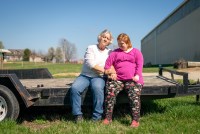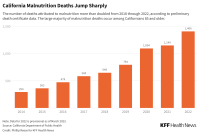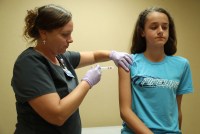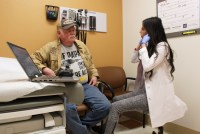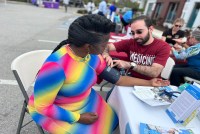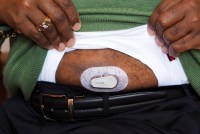Latest KFF Health News Stories
California’s Medicaid Experiment Spends Money to Save Money — And Help the Homeless
Gov. Gavin Newsom’s ambitious experiment in health care is supposed to cut costs as it fills the needs of hard-to-reach people. The program’s start is chaotic and limited, but it shows promise.
As Pandemic Emergencies End, People Battling Long Covid Feel ‘Swept Under the Rug’
Millions of Americans suffer from long covid, which can have debilitating physical effects, including fatigue and difficulty breathing. Yet many patients feel they’re on their own.
People With Down Syndrome Are Living Longer, but the Health System Still Treats Many as Kids
The median life expectancy for a U.S. baby born with Down syndrome jumped from about four years in 1950 to 58 years in the 2010s. That’s largely because they no longer can be denied lifesaving care, including surgeries for heart defects. But now, aging adults with Down syndrome face a health system unprepared to care for them.
A Smart Move on Tax Day: Get Health Insurance Information Using Your State’s Tax Forms
A growing number of states — including Maryland, Colorado, and Massachusetts — are using tax forms to point people toward lower-cost health coverage available through state insurance marketplaces.
What the Health? From KFF Health News: The Confusing Fate of the Abortion Pill
The legality and availability of the abortion pill mifepristone is in question after a federal judge in Texas canceled the FDA’s approval of the first drug used in the two-drug medication abortion regimen. A 5th Circuit Court of Appeals panel overruled that decision in part, saying the pill should remain available, but only under the onerous restrictions in place before 2016. Meanwhile, another federal judge in Washington state issued a ruling in a separate case that conflicts with the Texas decision, ordering the FDA not to roll back any of its restrictions on the drug. Victoria Knight of Axios, Shefali Luthra of The 19th, and Sarah Karlin-Smith of the Pink Sheet join KFF Health News chief Washington correspondent Julie Rovner to discuss these issues and more.
The Drug Company That Prospered Without Creating Any Drugs
Horizon Therapeutics, which Amgen is acquiring for about $28 billion, grew large by snapping up cheap drugs from other companies, marketing them to perfection, and jacking up prices.
The Rate of Older Californians Dying of Malnutrition Has Accelerated
Californians 85 and older are especially susceptible to malnutrition. They accounted for almost three in five malnutrition deaths in the state last year.
Feds Launch Criminal Investigation Into ‘AGGA’ Dental Device and Its Inventor
KFF Health News and CBS News recently reported that multiple lawsuits allege the device has led to grievous injuries to patients’ mouths, resulting in loss of teeth.
As Montana’s Mental Health Crisis Care Crumbles, Politicians Promise Aid
One of Montana’s largest mental health providers has ratcheted back services amid financial troubles, leaving a vacuum. State policymakers have promised more money to aid behavioral health care, but lasting change could be years out.
California Bill Would Mandate HPV Vaccine for Incoming College Students
A state lawmaker wants all incoming college students to get an HPV vaccine, as part of a push to drive up vaccination rates and prevent cervical cancer. At least four other states have enacted a similar mandate.
Most Americans Say They or a Family Member Has Experienced Gun Violence
More than 1 in 5 Americans report having been threatened with a firearm, and almost as many say they worry about gun violence every day or almost every day, a new KFF poll shows.
Doctor Shortages Distress Rural America, Where Few Residency Programs Exist
Patients in rural northeastern Nevada soon will have fewer providers and resources, after a local hospital decided to close its medical residency program. Nationally, the number of rural residency slots has grown during the past few years but still makes up just 2% of programs and residents nationwide.
Doctors’ Lesson for Drug Industry: Abortion Wars Are Dangerous to Ignore
The American Medical Association ducked the abortion issue for years and now sees its members’ professional opinions second-guessed by lawmakers and judges. PhRMA is following the same playbook.
Watch: Rulings on Abortion Pill Have Far-Reaching Repercussions
Sarah Varney, a senior correspondent for KHN, joins Ali Rogin of PBS NewsHour to discuss the ruling by a federal judge in Texas that threatens nationwide access to the widely used abortion drug mifepristone, and a separate ruling in Washington state that reached the opposite conclusion.
Special Medicaid Funds Help Most States, but Prompt Oversight Concerns
Georgia is among 35-plus states that have used an under-the-radar federal funding mechanism to boost payments for hospitals and other providers under Medicaid. But a government watchdog and a congressional advisory commission say sparse oversight makes it hard to tell if the “directed payments” program is meeting its goals.
For Uninsured People With Cancer, Securing Care Can Be Like Spinning a Roulette Wheel
When uninsured people are diagnosed with cancer, accessing resources and paying for treatment can be daunting. The safety nets meant to help often fall short, say cancer physicians and health policy experts who study access to care. Some patients find it easier to play the odds.
High Inflation and Housing Costs Force Many Americans to Delay Needed Care
A recent Gallup Poll suggests that Americans are putting off medical care because of costs. Inflation and rising rents make it harder for people to make ends meet.
Montana May Require Insurers to Cover Monitoring Devices for Diabetes
Montana is one of several states considering expanding coverage of continuous glucose monitors, but insurance companies and some providers argue that not all people with diabetes need them.
No-Cost Preventive Services Are Now in Jeopardy. Here’s What You Need to Know.
A federal judge’s recent ruling on the Affordable Care Act is by no means the final word. Even parsing its impact is complicated. Here are key issues to watch as the case works its way through the legal system.
What the Health? From KFF Health News: The ‘Unwinding’ of Medicaid
As of April 1, states were allowed to begin reevaluating Medicaid eligibility for millions of Americans who qualified for the program during the covid-19 pandemic but may no longer meet the income or other requirements. As many as 15 million people could lose health coverage as a result. Meanwhile, the Medicare Hospital Insurance Trust Fund is projected to stay solvent until 2031, its trustees reported, taking some pressure off of lawmakers to finally fix that program’s underlying financial weaknesses. Alice Miranda Ollstein of Politico, Rachel Roubein of The Washington Post, and Amy Goldstein of The Washington Post join KHN’s Julie Rovner to discuss these issues and more. Also this week, Rovner interviews Daniel Chang, who reported the latest KHN-NPR “Bill of the Month” feature about a child not yet old enough for kindergarten whose medical bill landed him in collections.





